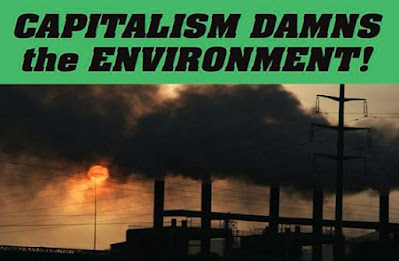Are we are approaching a ‘tipping point’ beyond which rising global temperatures cannot be stopped? As Glasgow's COP26 ends many believe that it may well be the case because of humanity greedy and ceaseless exploitation of nature.
Rather than accusing human beings as culpable for the climate emergency, the Socialist Party claims the culprit is the capitalist economic system.
The logic of capitalist competition forces each capitalist to obtain the maximum profit possible; otherwise, they will fall behind their competitors and go out of business. Production is therefore organised around the short term and the effect on the environment is of little concern for the capitalist. Any environmental harm is borne by nature itself and society. The necessity for capitalism to accumulate wealth and more wealth by re-investing is its overriding factor. Creating a profit is an end in itself under capitalism.
The common environmentalist approach focuses on individual consumption rather than questioning the logic of capitalist production itself. Companies are compelled to produce more in order to maximise profits with the effect that it creates the enormous waste of consumerism, urged on by an advertising industry, itself, socially useless. Obsolescence is built into products that are designed to be irreparable so that customers are trapped in a cycle of purchasing upgrades and replacements. Re-using and recycling while it shouldn’t be discouraged, is not a solution to the problem of waste and pollution as it does not challenge the insane logic of capitalist production and ignores the fact that consumers only account for a small minority of waste, most of which is created by industry and agriculture.
Garrett Hardin’s “The Tragedy of the Commons” provided an elite-friendly fable on behalf of capitalist private propertarians. The warming and poisoning of the planet are thanks to capitalism’s relentless drive to appropriate, commodify, and exploit every resource in the world.
Jason W. Moore, an environmental historian and historical geographer at Binghamton University, explains that “It was not humanity as whole that created large-scale industry and the massive textile factories of Manchester in the 19th century or Detroit in the last century or Shenzen today. It was capital.”
The most significant waste industry is the military and such non-productive activities as advertising, finance, insurance, real estate, rental and business services. On top of this was to be added the consumption of those who perform various policing and law-keeping operations for the capitalist system. Capitalism is wasteful in the wider ‘productive’ sector of the economy where a massive waste of energy occurs – when goods go by road that could go by rail or when workers are compelled to drive their individual cars to work through the inadequacy of public transport.
A future socialist society would prioritise human needs instead of profit and begin to restructure the economy and energy and transport usage in such a way that is sustainable and benefits humanity. Re-forestation would ensure that millions of trees would function as a carbon sink. Resources would be transferred from fossil fuel sourced energy to renewable energy and public transport. Studies have shown how solar farms in the Sahara could provide much of the energy needs of both Africa and Europe. The objection by mainstream economists is based on cost. Humanity as it consciously realises its power and its huge potential to change the world for the better should be seen as part of the solution, not the problem as some environmentalists mistakenly believe.
We can create a sustainable socialist society for the betterment of humanity and nature.




No comments:
Post a Comment